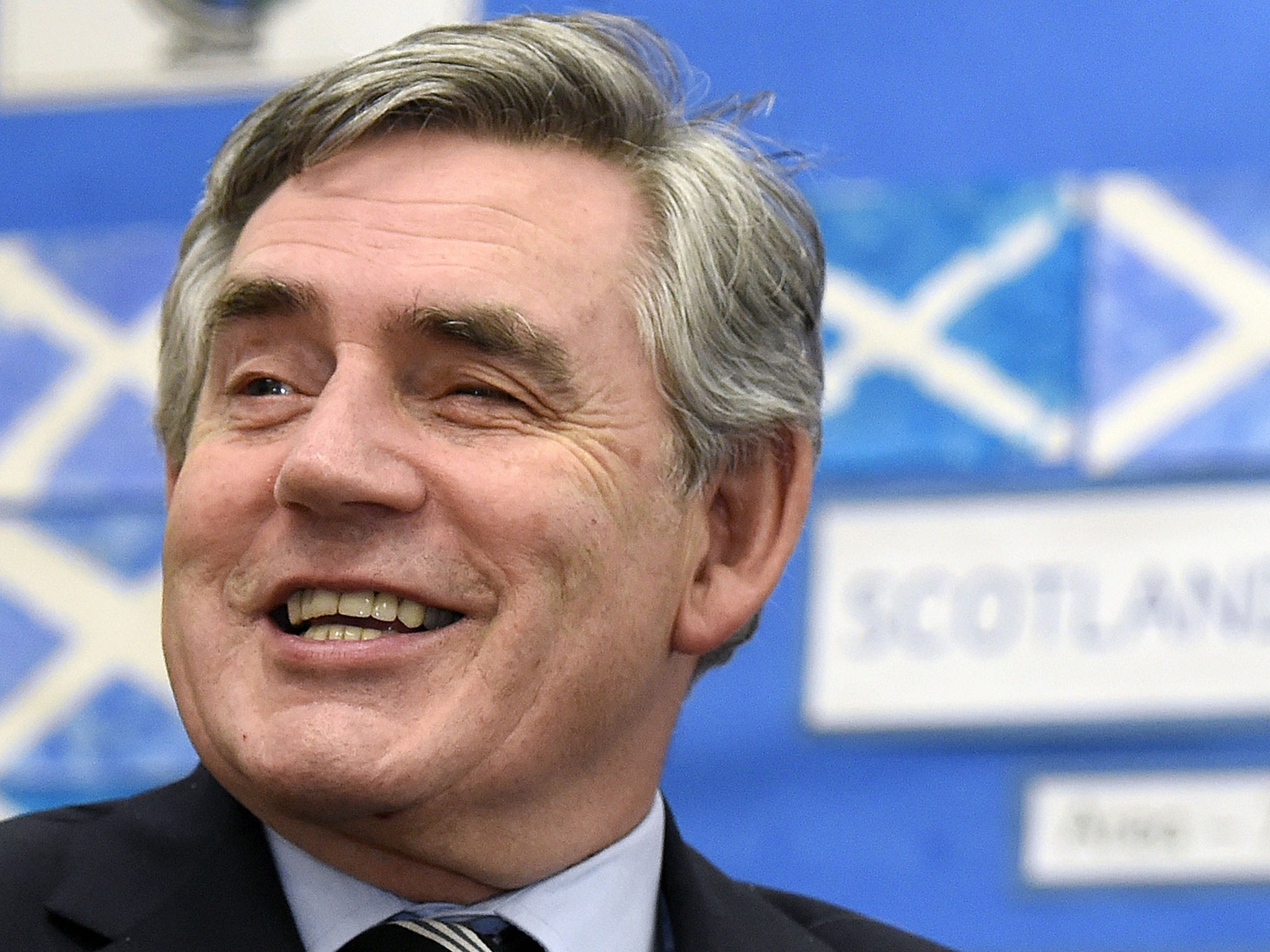Donald Macintyre's Sketch: Gordon Brown beats a path amid Tory threats, Labour evasion and SNP ‘discord’

Your support helps us to tell the story
From reproductive rights to climate change to Big Tech, The Independent is on the ground when the story is developing. Whether it's investigating the financials of Elon Musk's pro-Trump PAC or producing our latest documentary, 'The A Word', which shines a light on the American women fighting for reproductive rights, we know how important it is to parse out the facts from the messaging.
At such a critical moment in US history, we need reporters on the ground. Your donation allows us to keep sending journalists to speak to both sides of the story.
The Independent is trusted by Americans across the entire political spectrum. And unlike many other quality news outlets, we choose not to lock Americans out of our reporting and analysis with paywalls. We believe quality journalism should be available to everyone, paid for by those who can afford it.
Your support makes all the difference.During today’s devolution debate the SNP’s MPs had what passes for a tactic, which was to keep noisily interrupting the speakers from other parties to ask them where their leaders, Cameron, Miliband and Clegg were.
They would have been better off asking where Ukip’s Douglas Carswell was but there was no one to ask since there’s only one of him.
Nevertheless the absence of Carswell was odd since this debate wasn’t really about Scotland at all, but England. Scotland and the Union is so last month.
And in particular it was about English Votes for English for Laws (or EVEL as it’s known for short) which all the Tories now want and is quite a big Ukip issue.
But anyway, it was a silly question because the main speakers, William Hague and Sadiq Khan could make their own cases.
At least William Hague could. To describe Khan as struggling would be an understatement.
Hague had taunted Labour with its failure to join his Cabinet committee on it all; he said it was time to “confront” the West Lothian question (why Scottish MPs should have the right to vote on issues which were devolved in Scotland), threatened to turn EVEL into an election issue, and concluded as menacingly as the affable Hague ever gets: “The next few weeks will make it clear who is prepared to build a constitutional settlement that is better and fairer to all.”
To which Khan didn’t really have an answer. West Lothian would have to be “addressed” in time – a bit rich given that it’s been around since 1977 or, as Khan himself said, since the 1880s debates on Irish Home Rule. He promised to channel billions to the English regions and cities. He spoke at length about the electorate’s “anti-politics mood”. But you were left with the sinking feeling that, as Burke might have put it, “All that is necessary for the triumph of EVEL is that good men do nothing.”
And nothing appeared to be just what Labour had to offer.
And then there was Gordon Brown. Suddenly you remembered what a parliamentary speech was. Leaning forward, his left arm stretched towards his opponents, he could have been a figure in one of those 18th-century paintings of the Commons at its most intense, (almost) Charles James Fox in a business suit.
He skilfully invoked the monarchy with a reference to the PM’s “purring” gaffe. He castigated Cameron for linking the English question with the promise on devolution.
He sawed through interventions – magisterially telling the Tory Sir Oliver Heald at one point: “ I am going to answer the point that I am sure the honourable and learned gentleman is about to raise”. And he referred to the “siren voices of the SNP” trying to “wreak discord”, focusing on the new and unholy alliance between the nationalists and the Conservatives.
But above all he built a credible case that the Tories were endangering the union with an agenda –which he repeatedly challenged Hague to deny– of swapping 100 per cent income tax raising powers for restricting Scottish votes at Westminster – and those of the other “minority nations”. As he did so, the Northern Ireland DUP’s Reverend William McCrea nodded. Mr McCrea is not a man who nods lightly.
Suddenly it looked as if Labour might even have a case. He has an adjournment debate on the subject tomorrow. Otherwise he will as usual watch events from his home in North Queensferry. Or given the Labour Party’s current worries, should we be thinking of it as North Queensferry-les-Deux-Églises?
Join our commenting forum
Join thought-provoking conversations, follow other Independent readers and see their replies
Comments